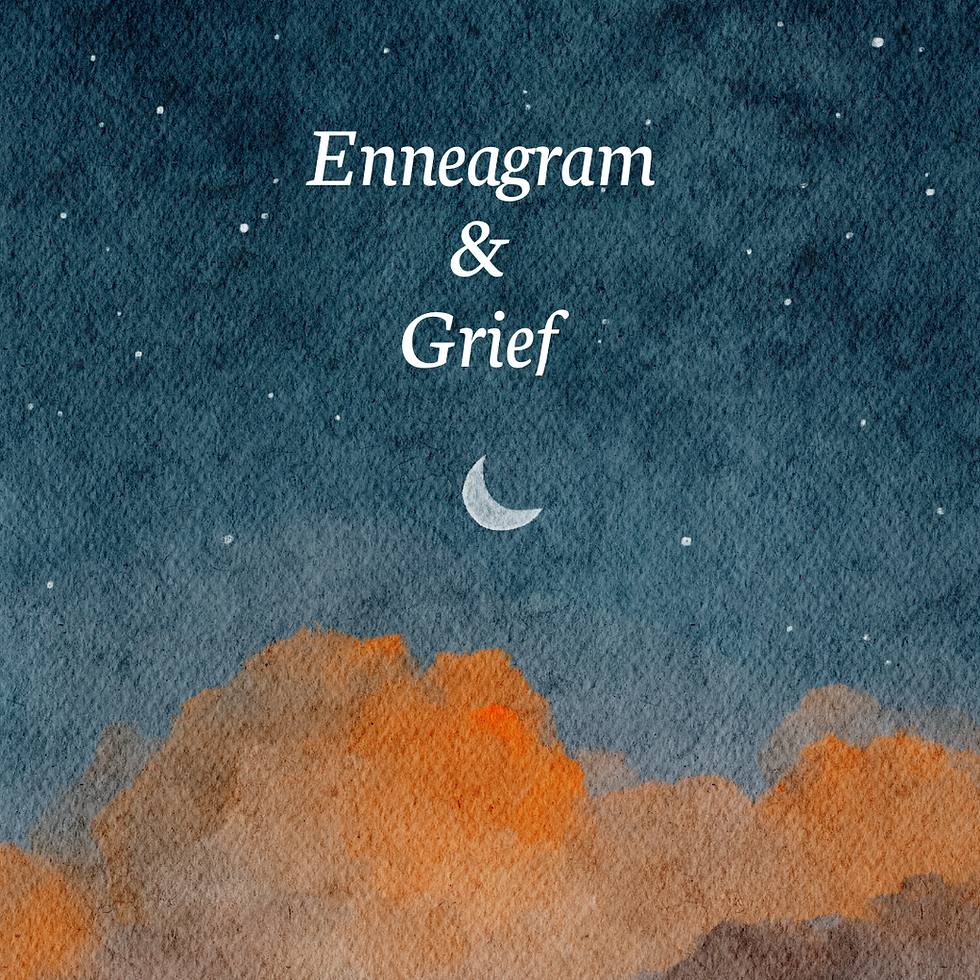Enneagram and Grief
- Kimberly Collins
- Mar 30, 2024
- 4 min read

Grief will come for us all at one point or another. I think what strikes me most about grief is how differently we handle it, how differently we think about it, and how differently we process it. Understanding this difference in ourselves and each others can mean the difference between separation and frustration and connection and support.
What is Grief?
We can think of grief as the emotions that accompany experiencing something incredibly heartbreaking and significant like the loss of a relationship, loved one, or way of life (including losing jobs), but it can be as simple (or not really as simple) as losing a part of your identity. Maybe you went from a single person to part of a couple or from a person without children to a person with children. Each change, even if it is a happy change, can be coupled with feelings of grief, because even if you gained something, you lost something as well. These feelings feel understandable and expected when we go through the "big griefs", but less so when we should be happy about the change in our lives, but oddly we feel a little lost still.
How Do We Move on from Grief?:
I wish there was an easier way of processing grief, but the reality is that grief (and all its facets including denial, sadness, anger, depression, and finally acceptance) just has be experienced. There's no getting around it. According to the experts, the best way for these emotions and grief itself to be integrated is through acknowledging the feelings, honoring it (and yourself) for its presence, and giving it adequate space and time to process. This sounds simple and easy, but there's a lot of pitfalls on the road to acceptance....
What Prevents us from Healing from Grief:
Clean Pain vs. Dirty Pain
Psychologist Steven Hayes divide human pain into two types of pain--clean pain and dirty pain. Clean pain is anything that an animal can experience and understand: death, physical pain, separation, etc. Dirty pain is anything that adds suffering to the actual pain in the form of meanings, interpretations, and stories. Let me give an example. Clean pain would be the death of a loved one and the acute sense of loss that accompanies this. It's simple, unavoidable, and acute. Dirty pain would be stories your brain makes up about it--"I was a bad partner/child/friend", "they never really loved me", "this is all my fault". These stories are optional, infecting, and ultimately a hinderance to our healing from clean pain. What I mean is that clean pain is just pain that needs time, a healthy environment, and a little TLC to heal, and dirty pain is a menacing infection that will prevent it. So, if you want to heal your clean pain, you must clear out the dirty pain--the stories, blame, interpretations--around it to heal.
How do you do this? One way is talking about your dirty pain to a compassionate other who will witness your dirty pain and shine truth on it. This can be a friend, family member, or therapist (and depending on the severity, probably should be a licensed professional), but it has to be someone who will help you remove the stories and the blame around your clean pain and not increase them. Another way is by noticing and working with your own dirty pain as it comes up by journaling, using Byron Katie's The Work or other thought work methods.
Avoidance:
Avoidance might be our favorite method of dealing with...well, anything. Don't want to feel sad, mad, angry, betrayed?? Just overwork, overeat, overcommit, over-watch. Numb out and hope that all those yucky feelings will just magically go away. Quick question...has that ever worked? It hasn't for me. Anytime I avoid the feelings that I need to feel, I end up expressing those feelings in some inappropriate, sideways manner. This could be by getting impatient with other drivers, yelling at the kids, or projecting my fears onto others so they become monsters of mythical proportion. The goal of avoidance is to not feel what you're feeling, but you're feeling it anyway..you feel me :). The best way to get out of the avoidance trap is to notice your emotions when they are leaking out sideways and call it what it really is: "I'm not traumatized by Percy for using a period and not an exclamation point in his email to me, I'm really sad and overwhelmed by my Dad's death"; "I'm not really THAT upset someone cut me off, I'm THAT upset at the loss of a future I imagined". Call it what it is and honor yourself for having a hard time.
Grief and the Enneagram
Each Enneagram Type will handle grief a little differently, but instead of getting too Type casted here (see what I did there :)), I think it's important to just understand general broad strokes how Types will process information, react when they are stressed, act to get their needs met, and deal with relationships. See the chart below for information on this. This information is definitely helpful when you are interacting with others while you are grieving or while they are grieving, but the biggest take away from all this information is that we are all different, so be kind to each other. Grief sucks no matter what, and there's no one right way to go through it. Loving each other and being gracious is always the right path forward.
Below are Triad groupings for processing information (Instinctual Triad), eliciting responses from others to get needs met (Interpersonal Coping Triad), reacting in stress and conflict (Conflict Coping Triad), and dealing with relationships (Relational Triad). Since these are Triads, you'll see similarities among Types in a Triad, but your Type will be unqiue in how it process all four elements represented by these Triads.
Instinctual Triad (how we process information)






Comments